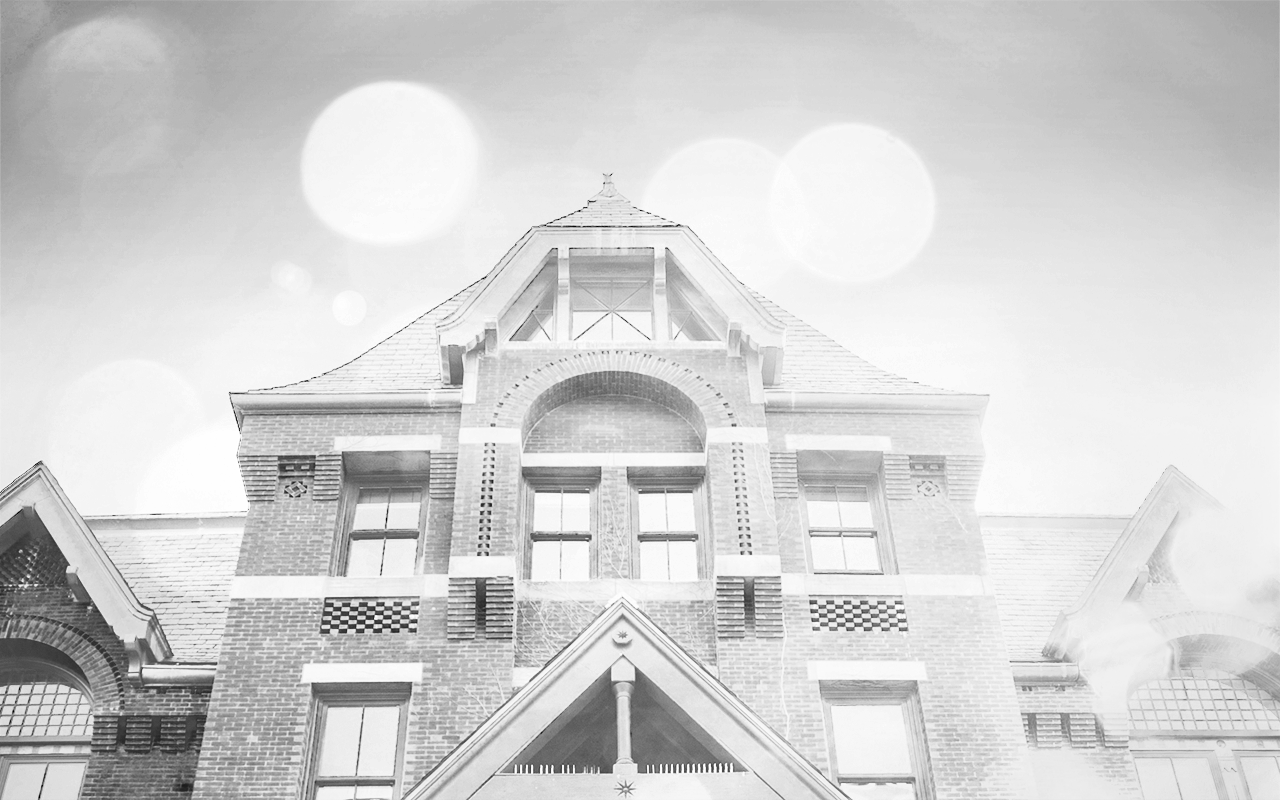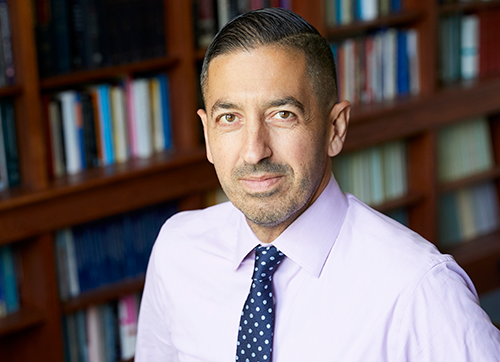Dean’s Note: Reconciling Competing Injustices in the Middle East.

Reconciling Competing Injustices in the Middle East
On acknowledging the reality of injustice in the region without equivocating in our responsibility to condemn terrorism when we see it.
On October 7, the terrorist group Hamas launched an incursion into Israel from the Gaza strip. As fighters fired thousands of missiles into Israel, terrorists entered the country by land, air, and sea in a sophisticated operation that caught the country by surprise. The terrorists then engaged in a shocking campaign of violence, targeting civilians and taking nearly 200 hostages. So far, about 1,400 Israelis have been killed. In response to these atrocities, Israel declared war on Hamas, bombarding Gaza and is preparing for a full-scale invasion of the strip, which is currently in a state of siege. So far, about 2,700 residents of Gaza have been killed. Earlier this week, the human toll of the conflict was made all too clear in the explosion at a hospital in Gaza, which has itself been subject to conflicting attribution of blame. The unfolding tragedy reflects, yet again, the tragic consequences of war for the health of populations and how these consequences fall disproportionately on the most vulnerable.
In the immediate aftermath of the conflict, I wrote a note expressing my horror at the unfolding events, reflecting on the horror of all wars and on public health’s responsibility when faced with such conflict. I later wrote a second note to our school community on shaping a better conversation about emotionally charged issues of consequence by taking time to pause, think deeply, and engage from a place of compassion and empathy. As I have been reflecting on this moment, it has become ever clearer to me that we cannot understand the present without thinking deeply about the past. History is a determinant of health. History is at the heart of all that unfolds in the present, including what we are seeing in the Middle East. It is also true that the study of history is, in large part, the study of injustice. We cannot understand, much less constructively address, the troubled relations of Israelis and Palestinians without engaging with the history that has shaped it. It is also history that urges us to recognize the events of October 7 for what they were: a pogrom against Jews carried out by a terrorist group which uses the worthy cause of Palestinian liberation as a shield for its hateful ideology just as it uses innocent civilians as shields for its fighters. Our engagement with the history that shapes the present should encompass all of this. We should speak the truth about the past as a means of staying honest about the present. This does not mean embracing a stance of moral equivalence where one does not, and should not, apply. But it does mean acknowledging the presence of many injustices, reflecting a commitment to be honest about all of them, a commitment which is never more necessary than in the context of what we now see in the Middle East. Some thoughts, then, on reconciling the present with past horror and injustice, towards shaping a better, healthier future.
The late Dr Michael Grodin, a professor at our school, physician and medical ethicist who helped treat survivors of war and genocide and whose work included deep study of the Holocaust, taught me we should not be in the business of comparing atrocities. Injustice is injustice whenever and wherever it emerges. We in public health are committed to understanding context, the structural forces that shape outcomes, but we are not moral relativists. Core to our work is the recognition that injustice exists and that we cannot create a better world without addressing it. There is right and there is wrong, and it is our job, always, to elevate the former while condemning the latter.
Consistent with this, nothing about the present horrors of what is happening in Israel and Gaza obviates the truth about the injustices that have been visited upon different peoples over many decades. That Palestinians have long been second-class citizens in the Middle East seems incontrovertible. That many have unjustly lost homes, lost lives, is irrefutable. The history of such injustice should be kept in mind always as we think about the forces that have shaped the Middle East. It is also necessary to keep in mind the history of global antisemitism of which Hamas’ offensive is the latest example. Jews worldwide have suffered injustices over centuries, culminating in the Holocaust, and reflected in substantial efforts by many countries to minimize their claim to statehood. These are all injustices, and all should be decried by people of good conscience.
This aligns with our core mission in public health—to speak the truth about injustice, to name it when we see it, and to work towards a world where it no longer holds sway. In this, our work echoes the words of Martin Luther King, Jr., who wrote, “Injustice anywhere is a threat to justice everywhere.” This means trying to widen our view, to pay attention to injustices that happen far from the people and places we see every day. Doing so can be difficult, biased as we often are towards the proximate. When I reflect on what I have written about war, for example, I find I have not done enough to address ongoing violence in Syria, Yemen, and Sudan, or in any number of other places where we have allowed drawn out conflict to become a kind of background noise, to which we have become, shamefully, inured over time. When we do widen our gaze, what we see can feel overwhelming. It can be hard to wrap our minds around the extent of the violence and misery that is the daily reality of many in our world. It is incumbent on all of us to do the hard, sustained work of not looking away, of bearing witness to the reality of conflict and using our voices to ensure suffering is not forgotten. We should not let factors like our biases, our privileged position of living in a high-income country, or our tendency to see the world through a predominantly Western lens prevent us from drawing attention to, and working to end, conflict throughout the world. This is particularly true for those of us who are privileged to have a platform, to be able to speak with the expectation that some will listen. There are many occasions when those working in the academic space have used their position to advocate for a just outcome to international conflicts. I have long admired, for example, the work of Noam Chomsky in drawing attention to the genocide in East Timor, work which helped create the conditions for a resolution to an intractable conflict.
And, extending this success, there can be hope. In recent decades, we have seen conflicts which seemed intractable ending. This was the case, for example, in Northern Ireland. For decades, the region was wracked by sectarian violence. Religion, class, geography, and group identity inflamed tensions which often erupted in bloodshed. Police brutality, terrorist bombings, kidnappings, and killings were regular occurrences in the region, as the violence dragged on with no clear end in sight. At the same time, those working to end the violence had to reconcile competing, often justified, claims of injustice visited on them and their communities. Each side committed abuses against the other, each could credibly say the other was being intractable, each inflicted suffering on innocents. Finding a path to peace meant both sides accepting their common culpability and working towards a better future. After many false starts, this work led to a political settlement, the Good Friday Agreement, which largely put an end to the violence. The settlement became possible through dialogue, compromise, and a willingness to set aside old, even justified, grievances for the sake of peace. In charting a path out of war and division, the Northern Ireland peace process showed how such work—which we also saw in other countries such as South Africa—can be done.
Many are working towards a similar settlement in the Middle East. Even at moments of crisis and tragedy, there are always those, on both sides, who are pursuing a vision of peace. Throughout the longstanding conflict in the region, Palestinians and Israelis have come together to work towards a peaceful future. Now recent events threaten to set back progress and deepen divides. As Israel engages in reprisals, and the threat of Hamas persists, we will likely see more violence. This makes it even more critical that we continue working for peace, in whatever ways we can.
For this reason, it is particularly important to draw a distinction between those who are working for peace and those who are spreading terror and hate. There should be no moral confusion about this. It does a disservice to conflate the efforts of Palestinians who are peacefully working towards a better future with what Hamas has done. Such terrorism does not reflect a just approach to the challenges of the region. It is the kind of explicitly antisemitic violence that we, as individuals living in a post-Holocaust world, have a basic moral duty to name and condemn. As history urges us to remember what has been done to the Palestinians, it also urges us to hear in the rhetoric of Hamas echoes of other voices that have targeted Jews and to see in the violence of this month what these words can lead to.
I was in New York City on 9/11, another time of sudden violence and terror. I remember the shock of that day and the days after. I also remember the spirit of solidarity and community with which many in America and the world responded to the attacks. Somehow, many who had cause to feel hate found compassion within themselves, a willingness to work towards a better world, even in the midst of grief. In the context of the recent terror in Israel, which has been compared to 9/11, it is on all of us to act with compassion, to comfort those who mourn, and to work—mindful of the weight of history and with eyes open to present realities—towards a better future.
Warm regards,
Sandro
Sandro Galea, MD, DrPH
Dean and Robert A. Knox Professor
Boston University School of Public Health
Acknowledgement: I am grateful to Eric DelGizzo for his contributions to this Dean’s Note.
Previous Dean’s Notes are archived at: http://www.bu.edu/sph/tag/deans-note/
